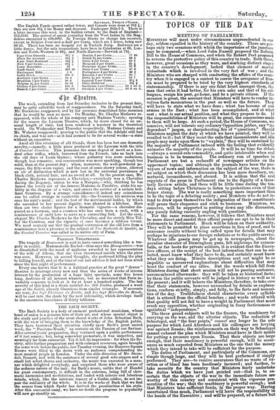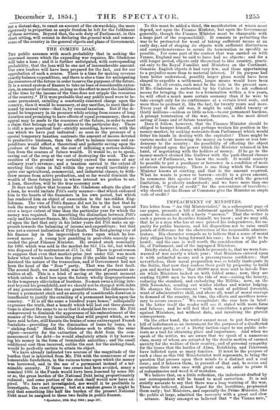TOPICS OF THE DAY
MEETING OF PARLIAMENT.
Mnersrees will meet -under circumstances unprecedented in our day, seldom equalled in the history of the country. There are per- haps only two occasions with which the importance of the juncture may be compare,d,—when, Lord John Russell proposed the Reforra Bill to the House of Commons, and when Sir Robert Peel proposed to reverse the protective policy of this country in trade. Both those, however, great occasions as they were and marking distinct stages in the country's development, lacked that element of mortal vicissitude which is involved in the veryfact of war ' • and the Ministers who are charged with conducting the affairs of the coun- try -when it is engaged in a contest to come the arrogance of Rus- sia must be prepared to be tried by the very highest standards of statesmanship. If there is any one faint heart amongst them, the man that owns it had better, for his own sake and that of his col- league; resign his post, go home, and be a private citizen. If the occasion is great, the account that Ministers will have to render in- volves facts momentous in the past as well as the future. They will have to state what we have done ; what has 'become of our armies in the East • what has been accomplished, and at what cost; what is our aeinal position, and what they propose to do. If the responsibilities of Ministers will be great, the concessions made to them will be large. At such a period, the House of Commons, we conceive, will not tolerate any ordinary Opposition jabber, any"in- dependent " jargon, or sharpshooting fire of "questions." Should Ministers neglect the duty at which we have pointed, they will he recalled to it ; but if they resist the calls that inconsiderate and idle people may make upon them to "explain," they will be sustained by the majority of Parliament imbued with the feeling that evidently animates the majority of the people. It will be no time for debate —always a second-rate commodity, and quite intolerable when real business is to be transacted. The ordinary run of speeches in Parliament are but a rechauffe of newspaper articles on the uppermost topics; and although the journals have been the pur- veyors of news and information on the subject of the war, there is no subject on which their discussion has been more desultory,'on- matured, inconsiderate, and absurd. It is seldom that the oral copyists of the press in Parliament rise to the dignity of a Quar- terly Review article, and there will be little time during the ten- days sitting before Christmas to listen to prelections even of that larger stamp: The war is really something more important than to be the topic of a debating society; and Members who do not in- tend to draw upon themselves the indignation of their constituents will prune their eloquence and stick to business. Ministers, we conceive, will be supported in putting down any idle discussion, any purely fishing curiosity angling with questions.
For the sense reasons, however, it follows that Ministers must be more direct and candid than official people are apt to be in their statements to Parliament. Much will be taken on their authority. They will be permitted to place assertions in lieu of proof, and to announce results without being called upon for details that may perhaps be injurious to our foreign relations or to the public service. Whatever idle gossip may be got up in newspapers, about the peculiar character of Rirmingham guns, felt nightcaps for cannon- balls, or fur boots for private soldiers, it is evident that the Execu- tive officers, at the receipt of the best information that can be col- lected, must know what they have to do, and certainly must know what they are doing. Minute descriptions sent out might be as impolitic as unreserved explanations about difficulties that may beset the conduct of our allies. But the words which fall from Ministers during that short session will not be passing sentences, unremembered afterwards: they will be taken as historical facts ; by them the public servants will be judged in history as well as in the present; and it will behove the Ministers, therefore, to take care that their statements, however nnvouched by details or explana- tions conform strictly, simply, and fully, to the facts and necessi- ties Of the day. Truthfulness should characterize every syllable that is uttered from the official benches ; arid words uttered with that quality will not fail to have a weight, in Parliament that must crush any opposition, whether originating in fussy factiousness or egotistical "independence."
The three grand subjects will be the finance, the machinery for carrying on the war, and the ulterior objects. The reduction of Sebastopol, and "the four points," cannot any longer be the sole purpose for which Lord Aberdeen and his colleagues are levying war against Russia; the reinforcements on their way to Sebastopol cannot exhaust the plan which Ministers must have in their minds for putting a pressure upon Russia. That their objects are large enough, that their machinery is powerful enough, will be assur- ances as much expected from Ministers as the one that the money which they intend to take will be sufficient for the purpose. The duties of Parliament, and particularly of the Commons, are simple though lai;ge, and they will be 'best performed if simply performed. They are—to receive assurances that no waste of ex- ertion or of blood- has been heedlessly incurred; and further, to take security for the country that Ministers fairly undertake the duties which we have just pointed out—that is, to as- certain that the objects of the war in the immediate future are worthy of this country and consistent with the vigorous pro- secution of the war ; that the machinery is powerful enough; and that Ministers take sufficient funds, in the proper way. Having ascertained thus much, Parliament will leave the responsibility in the hands of the Executive ; and will be prepared, at a 'future but not a distant day, to exact an account of the shewardship, the more rigorously in proportion as ample freedom be left for the fulfilment of those services. Beyond that, the sole duty .of Parliament, in this short sitting, will consist in declaring the general wish and concur- rence of the country in the general objects and plans of Government



































 Previous page
Previous page